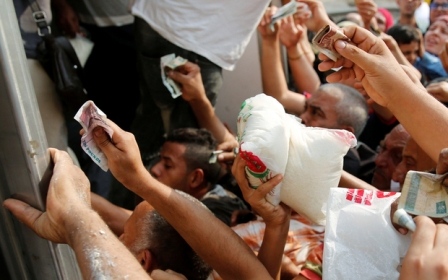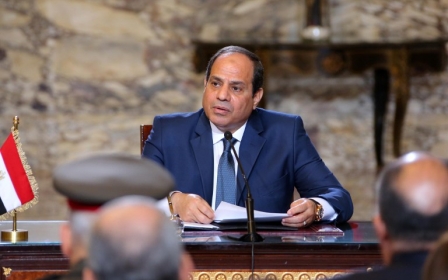Egypt to raise electricity prices in latest set of austerity measures

Egypt will raise electricity prices by 14.9 percent beginning in July, as the government seeks to fulfil a commitment to the International Monetary Fund (IMF) to reduce the country's budget deficit.
The increase, announced by Electricity Minister Mohamed Shaker on Tuesday, comes as part of Egypt's efforts to slash energy subsidies.
The country committed to that when it inked a $12bn IMF loan programme that began in 2016 and is now in its final phase.
This isn't the first time the government has raised electricity prices in recent years, however, as part of a series of economic measures that have hit Egyptians hard.
In July last year, the government raised the prices for different consumption categories by an average of 26 percent. Before that, the costs went up by 40 percent in July 2017 and 30 percent in July 2016.
New MEE newsletter: Jerusalem Dispatch
Sign up to get the latest insights and analysis on Israel-Palestine, alongside Turkey Unpacked and other MEE newsletters
In total, prices for the lowest consumption category (0-50 kWh) have increased by 113 percent since 2016 in Egypt.
The country's economy has struggled since the 2011 uprising that toppled longtime leader Hosni Mubarak, and in an attempt to tackle a critical budget deficit, the government has implemented an austerity plan backed by the IMF.
The Egyptian government says the measures have helped stabilise government finances, while the IMF argues that new fiscal policies and a flexible exchange rate have contributed to economic stabilisation and have made Egypt more resilient to external shocks.
Egypt's GDP has grown from 4.2 percent during the 2016-17 fiscal year to 5.3 percent in 2017-18, the IMF said last week as it announced an agreement to disburse the final tranche of Egypt's loan programme.
But Egyptians have struggled to cope with the austerity measures.
In 2016, the Egyptian pound was floated, causing it to lose 50 percent of its value - and Egyptians have lost much of their spending power as a result.
The prices of basic consumer goods, property, education and healthcare also have more than doubled since the currency devaluation.
The currency reform hit the middle class particularly hard, Reuters reported in March, while inflation remains high, poverty has increased and unemployment is not going down as quickly as people had hoped.
Middle East Eye delivers independent and unrivalled coverage and analysis of the Middle East, North Africa and beyond. To learn more about republishing this content and the associated fees, please fill out this form. More about MEE can be found here.




